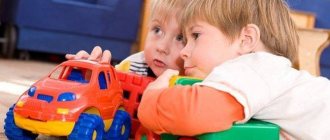Socialization of the individual as a process of integration of a person into the general social system of society provides the necessary skill of communication with the environment. And to the question “what is it” there is only one answer - this is the process of assimilation by a human individual of patterns of behavior, psychological attitudes, social norms and values, knowledge, and skills that allow him to function successfully in society.
When a person is born, he immediately enters into socialization with the people around him and finds himself in a certain environment formed first by parents, medical staff of the clinic, relatives and close family friends. In the future, the role of socialization of the individual only intensifies: with the expansion of the boundaries of the world, the number of connections and people with whom one has to interact increases, and it is extremely important that the process proceeds smoothly and is not disrupted.
In the process of growing up, children not only acquire personality, self-awareness, learn communication skills, but also expand the scope of their interests and become increasingly involved in the process of interaction with family members, neighbors, other children, learn to communicate, find compromises, give in and defend their point of view .
Main age stages of socialization
Psychologists distinguish the following stages of personality socialization:
- primary socialization is the process of socialization that occurs from the birth of a person to the final formation of his personality;
- secondary socialization is the process of a formed personality entering society.
Primary socialization includes a person’s acquisition of social norms and rules in the early stages of life, from birth to adolescence; the secondary stage begins gradually with the expansion of the teenager’s social circle, the appearance in his life of more hobbies and groups formed in society under the influence of these hobbies.
The stages of personality socialization are clearly divided, but there is no hard boundary between them. It cannot be said that until the age of 14, for example, a person exclusively shapes himself, and after that he learns to fit himself into society. On the contrary, in essence, both stages are characteristic of us throughout our lives, it’s just that at an early stage of development, the child’s psychological characteristics are aimed at knowing himself, and later they are redirected outward, towards fitting himself into society, but even at retirement age one should not think as if the personality is completely formed and cannot be changed.
Features of socialization in childhood
It is in childhood, thanks to family influence, that the child develops those patterns that he considers generally accepted, and which he later guides during subsequent socialization.
At this stage, the child learns basic rules and norms exclusively from family members, since his inner world is extremely small and his environment is limited. And if a certain set of prejudices is accepted in the family, then the individual will enter the next stage of socialization with an opinion already formed in his head, taking into account the main family “party line”.
One of the problems of personal socialization associated with raising a child is the concept of the norm of family violence. If violence in a family is considered an indispensable attribute, if the father raises his hand against the mother, and the mother tolerates it and does not try to leave home, the child begins to perceive this situation as a given, and family violence as a variant of the norm for the entire society as a whole. And in the future he goes out into the world with the confidence that all his friends in the house have the same thing going on, they just, like him, are forbidden to talk about it.
Such a child may get a whole bunch of problems in the future when he is faced with the fact that for trying to raise his hand against a girl he will be scolded and ostracized in every possible way, and he will not be able to understand that the problem lies in his behavior, since for him personally this is an absolute norm.
Socialization of the school period
Socialization of the individual at the stage of school education gradually moves the child from the stage of primary socialization to secondary.
At school, an individual’s social circle expands sharply: after a couple of dozen people with whom he constantly communicates or occasionally meets in a kindergarten or clinic, the child finds himself in a big world full of classmates and children from parallel streams.
The attention of adults is not as carefully controlled as it was before, and the child gradually learns to establish relationships with other small individuals, acquires likes and dislikes, learns to behave in accordance with the new rules adopted in the group of students, gets used to the new environment and develops qualities that which in the future will help him establish contact with work colleagues and representatives of other social groups.
At this stage, the problems of socialization are those habits and typical reactions that are formed in him in response to the influence of others.
If a child was brought up in a family like a little prince, was surrounded by the love of his grandmothers and mother, if he grew up in the confidence that all his actions are correct and no one has the right to be dissatisfied with him, he will most likely not fit into the group of classmates, as a habit demanding obedience is unlikely to be appreciated by other children as a pleasant character trait.
Teenagers and self-discovery
Adolescence is a stage of development at which the child begins to spend more time with peers rather than with family members, and thereby makes his transition from the primary stage of socialization to the secondary stage - the formation of not only personality, but also the search for his place in the world .
At this stage, active group socialization of a person begins - he is looking for groups in which he could feel comfortable, be approved, significant, where he could share experiences and thoughts; Gender socialization enters the active phase - awareness of oneself as a representative of a certain gender and assessment of the social roles of representatives of one’s gender in society, acceptance or rejection of these roles in relation to oneself; the process of resocialization begins - a reassessment of previously mastered skills and values in view of gaining new experience and broadening one's horizons.
One of the common problems in the socialization of a teenager’s personality is the situation when he finds himself in an environment that accepts other, unusual standards of behavior as the norm and is left with a choice: to overestimate his own judgments or to defend his opinion and receive rejection from group members.
Family: the emergence of personality
The family is the main agent of primary socialization , the child’s first environment, which determines the entire subsequent process of entering society.
With the help of the family, children fit into society. Parents shape the child's qualities from the early stages. The absence and lack of attention of parents contributes to the appearance in children of many psychological, social deviations and complexes that greatly disrupt normal activities in the future.
Parents create the basis of personal qualities, social status affects the status of the child, profession determines the educational and cultural level. The family lays the foundation for moral, family, and gender values.
Family can be a negative influence. Alcoholism, conflicts, divorces, social exclusion, and cruel treatment leave a serious imprint on the development of a child’s qualities that are important for society and his worldview.
The family is at the center of problems related to the physical, psychological, and social health of children. Social development also depends on other agents, the qualities of the individual, and innate traits. Therefore, children raised in a dysfunctional family do not necessarily grow up to be criminals, but can become highly moral people and full-fledged individuals.
Group socialization
The assimilation of norms accepted as fundamental in society, rules of behavior, restrictions and unacceptable actions is the process of education and instilling in a child a clear understanding of the boundaries within which he must move in order not to be rejected by others.
Our society is structured in such a way that an individual needs to receive social approval, belong to a group, and feel the support of members of this group. And for this we are forced to behave in a certain way, follow certain rules of behavior and fall into the pattern set by the group we want to join.
Patterns of behavior among groups can be different and even diametrically opposed: for some groups, community based on financial solvency is important, others, on the contrary, are formed by uniting poor members of society and declare themselves to be opposed to wealthy circles.
It is important to understand that it is impossible to socialize universally one hundred percent in such a way as to ideally fit into absolutely all segments of the population and groups, precisely because they value different qualities and opposing values. It’s not for nothing that people say: “You’re not a piece of gold to please everyone!” - you cannot please everyone, and in the process of socialization a person has to choose which group to join, and also oppose himself to some other group of people.
Education is an action aimed at the individual
Education is an indicator of development or a directed psychological, pedagogical process of the formation of important personal qualities. It depends on one’s own efforts, inclinations, inclinations, and performance, manifested in different types of activities. This explains its different effect on people living and brought up in the same conditions.
Methods of social education
It performs the following functions:
- organizes influences, factors;
- creates conditions for accelerated entry of a person into society;
- helps to overcome and reduce the negative consequences of spontaneous socialization, impart a positive personal orientation and motivation.
Consciousness of group selection
The choice of social group with which you interact is not always up to you. We make a conscious choice when we decide to take up a particular sport, enroll in a certain university, or move to another neighborhood. In this case, we can prepare ourselves for the norms that will most likely be characteristic of the environment in which we will find ourselves, since we will have time to study the issue, work on our reactions and socialization skills.
But sometimes, due to circumstances beyond our control, we find ourselves in an environment that cannot be called successful, and this is especially dangerous for not fully formed individuals - children and adolescents.
In the event of a forced move to a less favorable area, adult family members are able to distance themselves as much as possible from their neighbors and establish contact with them that does not include accepting their social standards of behavior. But a child or teenager, communicating with classmates and neighbors, does not yet know how to resist someone else’s authoritative opinion, and unconsciously absorbs and adopts those norms of behavior that he should not include in his picture of the world as correct.
This problem of personal socialization cannot always be solved by parents prohibiting the child from communicating with “bad” friends, but the environment in which your child grows up is a very important factor in growing up and shaping his personality.
School is a social institution
The school provides children with a systematic education and provides a comprehensive educational process. Educational and educational institutions are the concentration of culture, political and moral values. The school is designed to support socialization, which begins in the family, and correct it if necessary, which is quite difficult to do. The work of an institution depends on the personal and professional qualities of teachers, educators, the microclimate of the team, forms, methods, the modernity of the educational institution, and many other factors.
Human socialization and personality education are inextricably linked processes, complementary and at the same time opposite. Without them, the full development of a person as a full-fledged member of society, who is a formed personality, is impossible.
Gender socialization
The socialization of the individual cannot be fully accomplished without the individual mastering the cultural system of relationships between men and women characteristic of the society in which he lives, as well as awareness of gender roles and his place in this system.
Society begins to instill certain behavioral stereotypes in children literally from the cradle: in stores, for the most part, they offer a choice of only pink or blue baby care items, boys’ clothes are made mainly in blue, and girls’ in red, boys are given cars and pistols, and girls - dolls and decorations.
In the future, looking at the parents and guests of the family, the child absorbs those standards that pass before his eyes in the process of growing up: if the mother and her friends are mostly housewives and take care of cooking, cleaning and the house, and the father and his friends earn money and drive cars and play football, the individual will most likely internalize such a traditional value system, and in the future will begin to apply it to himself in accordance with his gender: a boy will strive to become a “breadwinner”, and a girl will be aimed at finding a husband who meets certain criteria, and dream of marriage and children.
If it is accepted in the family that mother works equally with father, and father cleans on weekends with mother, in the future the girl will not understand if her husband begins to demand that she sit at home and cook soups, and the boy does not appreciate his wife’s desire to become a housewife and study exclusively family matters.
Functions and role
Socialization in psychology is a phenomenon that performs the following functions:
- normative and regulatory function. It shapes human activity with the help of certain influences on him from social institutions that regulate the social way of life;
- personal-transformative function. It consists of individualizing a person through the formation of his need-motivational sphere, as well as a system of values and ideals;
- creative function. At the stage of its implementation, a person has a need for self-realization through creative activity, solving situations in non-standard ways;
- communication and information function. It ensures a person’s relationship with society, gives the individual information about the characteristics of interaction and the desired lifestyle;
- procreative function. Consists of generating a willingness to act in a certain way;
- value-orientation function. It forms a system of values that determine a person’s lifestyle;
- compensatory function. Replenishes the deficiency of necessary physical, mental and intellectual properties and qualities of a person.
The role of socialization is:
- self-disclosure of personality (society is given indirectly, through a set of individual life programs);
- adaptation of the individual to the social environment (individuality adapts to external conditions, maintaining the initially specified essential parameters);
- mastering a certain set of patterns (the individual is ready to accept some proposed patterns of behavior);
- building a personality according to a given prototype (the individual is completely subordinate to the society that creates him according to a certain plan).
Resocialization
The concept of personality resocialization is closely related to the stages of growing up. In essence, this term denotes the secondary socialization of the individual, which continues throughout life and includes a constant reassessment of previously accepted values.
Resocialization begins with the child going out into the outside world and observing people with different cultural, social and gender stereotypes. The more such observations a child accumulates, the more work happens in his head: he begins to understand that not all the words of mom and dad are axioms, that there are other points of view and a different view of the world. And under the influence of these factors in adolescence, the individual completes the formation of his personality, leaving some of the previous family attitudes, and replacing the remaining attitudes with others accepted from the outside and regarded by him as more suitable for him personally.
Over time, an individual’s social circle expands more and more, goes beyond the boundaries of school and university, and includes colleagues, friends in the gym, acquaintances from different segments of the population, therefore resocialization as an important element of personality formation is an endless process.
Principles of harmonious development
The formation of a harmonious personality is aimed at achieving the following goals:
- formation of the consciousness of a citizen, a patriot;
- familiarization with universal human values;
- development of creativity, ability to create;
- formation of an adequate self-concept, the ability of self-realization.
Principles to be followed:
- respectful, trusting relationships between teachers and students;
- conformity with nature (taking into account age, gender, and other natural characteristics);
- cultural conformity (reliance on the cultural traditions of the people);
- humanization, aestheticization of the environment of an educational institution.
Legal socialization
Legal socialization of an individual is the development in a person of certain ideas about his place in society, as well as about his social role and the culture of society as a whole.
The main feature of the legal socialization of an individual is the process of assigning to a person certain typical (predictable) reactions, ways of perceiving information and forms of activity accepted in this particular society.
Having perceived the norms and rules accepted in the society around a person as the basic and only true ones, the individual subsequently reacts negatively to any deviations from this norm, often evaluates them as an attempt to violate public order as a whole, and even actively opposes those who exhibit unusual behavior for the given person. reaction society.
Legal socialization of an individual is a necessary and important process, at the same time closely connected with society’s attempts to discard any progressive ideas unusual for it, which seem to successfully socialized members of society to be a violation of the very foundations of the existence of a social group or the nation as a whole.
Legal socialization of the individual makes it possible to build a clear hierarchical structure of the group, within which subjects who most clearly adhere to the standards of behavior approved by society easily increase their status and are fixed on the upper tiers of the pyramid, and individuals with non-standard views on life are rejected.
Concept of education
Upbringing is a microfactor influencing socialization . A socialized individual conforms to norms, values, resists the negative effects of the environment, trends that inhibit or deviate the development of individuality.
There is no generally accepted definition of the term. This is due to the polysemy of the concept. It is considered as a socially oriented activity, process, impact on an individual.
Education is the directed influence on human activity of organized institutions of society, the environment, and one’s own activity. It is aimed at the formation of the necessary stable personality traits and individual qualities.
In psychological science, education is an activity that transfers social, historically accumulated experience to the next generation. It is a purposeful action on consciousness, then on behavior through the formation of life-significant attitudes, ideals, and value orientations that provide conditions for further development and preparation of the individual for life in society and work. The goal is the expected planned changes obtained under the influence of prepared actions. Results – the degree of assimilation of planned features, norms, rules. The norms that parents seek from the child become internal ideals, principles of worldview.
Important
Lack of education leads to deviations in mental development and disruption of the formation of social roles required for life in human society.
Desocialization
The concept of desocialization of the individual is closely related to resocialization, and means the destruction of previously mastered and accepted norms and rules of behavior, the destruction of previous attitudes. What is it and why is this process needed?
This process is used by psychologists when a person’s learned norms of behavior prevent him from successfully fitting into society. In this case, a person must desocialize - abandon previous attitudes, and then resocialize - accept new rules of behavior adopted in the group.
Desocialization is necessary for victims of domestic violence, people who went through wars and lived in combat zones, as well as those who moved to other countries with a different cultural heritage or when re-educating individuals suffering from deviant behavior - alcoholics, drug addicts, criminals. “Reconfiguration” of the head in such cases is necessary, and the process plan usually begins with an assessment of the attitudes that the individual sees as unshakable, and proof that this unshakability is apparent.
Management methods
Socialization in psychology is a process that plays a decisive role in personality development from an early age. Socialization management methods are most often used in education; comparison of the features of the socialization process and the possibilities of education allows us to determine the specific functions of educational activities in managing the positive socialization of the child.
Compensation for the shortcomings of primary socialization
It is known that primary socialization plays an important role in the child’s acquisition of first communication skills and his understanding of behavioral norms. The prevalence of child abuse leads to the fact that entire groups of minors become victims of unfavorable socialization conditions.
The decline of the family institution itself, experienced by adults, also has an adverse effect on the socialization of children. Therefore, education must fulfill the task of compensating for the attention that the child did not receive in the family.
It can be performed by the teacher using the following positions:
- accepting the child as he is;
- understanding the reasons for a child’s isolation;
- creating a situation of success for the child;
- inclusion of the child in activity situations where he can feel significant.
Prevention or correction of children's complexes
Children often lack self-confidence due to a feeling of failure in their activities. The child feels discomfort due to the disdainful attitude and hostility on the part of his peers, begins to consider his appearance ugly and find fault with himself.
These processes lead to the formation of complexes and learned helplessness in the child, which subsequently interferes with the realization of the personality and its socialization. Therefore, it is important to create a favorable environment for the child’s development and convince him of his own usefulness and usefulness.
Expanding children's social experience
The formation of healthy socialization can be helped by the use of a set of activities, participation in which allows the individual to broaden his horizons and acquire the experience of humane relations in interpersonal interaction.
Such events include:
- excursions to museums, art galleries;
- communication with institutions of additional education and culture;
- socially oriented activities (improvement of the architectural and spatial environment, performance of concerts in front of the population);
- meetings with representatives of different professions.
The process of personal socialization is an important phenomenon that begins to manifest itself from childhood. Psychology distinguishes forms, types and stages of socialization, knowledge of which, along with correct diagnosis, can help to promptly identify problems in interaction with society and correct them in a timely manner using methods for managing the socialization process.
Author: Anna Fleyman
Deviant behavior
Deviant behavior is behavior that deviates from socially accepted norms, principles and standards.
Deviant behavior is not always a sign of something bad: for a patriarchal society, in which it is accepted, for example, that a woman does not have the right to vote, is obliged to hide her face, wear a skirt and remain silent, the behavior of an ordinary European woman will be regarded as extremely deviant, while in Europe they simply will not pay attention to it, since it fits into the standards of behavior accepted there.
The socialization of individuals can occur with disturbances, and then psychologists also talk about deviant behavior - it is because of improper socialization that people become criminals, they show a tendency to violence, cruelty, and illegal actions. Teenagers who are trying to stand out from the crowd and express their “I” also show signs of deviant behavior.
Deviant behavior is always the result of problems with the socialization of the individual, but, unfortunately, the socialization process cannot be written down as a plan and strictly followed.
Stages, stages
There are different approaches to identifying the stages of socialization. This can be seen in the example of famous researchers in the fields of sociology and psychology. Z. Freud identified 5 stages of psychosocial development. The nature of his understanding of the nature of personality and the process of socialization was manifested in the fact that 4 of them occurred before the age of twelve.
Stages of socialization according to S. Freud:
- oral stage;
- anal stage;
- phallic stage;
- latent stage;
- genital stage.
Reducing socialization to the movement of zones of concentration of libido seems to be a narrowed understanding of human nature, which is especially clearly manifested in S. Freud’s interpretation of culture as a result of sublimation. Despite the existence of criticism of Freudianism carried out from a variety of positions, indicating its one-sidedness, the significance of Freud’s provisions for theory and practice remains.
Well-known researchers L. S. Vygotsky, A. N. Leontiev, N. S. Leites, B. D. Elkonin formulated an approach to the periodization of personality development, highlighting the following stages:
- Infancy (0-1 year).
- Childhood (1-3 years).
- Preschool age (3-7 years).
- Junior school age (7-11 years).
- Adolescence (11-15 years).
- Adolescence (15-17 years old).
L. Kohlberg, a representative of the synthetic approach, identified 6 stages of socialization:
- Fear of punishment.
- Tendency to expect rewards.
- Seeking approval from society.
- Understanding and following the interests and rules of society.
- Analysis of moral beliefs.
- Actually ethical.
The most reliable and accepted periodization of personality socialization belongs to E. Erikson. They identified eight stages, covering the entire life of a person, from birth to death, as a single temporary space of socialization.
Each stage has its own psychosocial crisis.
- Early infancy, 0-1 year.
- Late infancy, 1-3 years.
- Age of play: 3-5 years.
- Middle childhood, 5-11 years old.
- Puberty, adolescence, 11-20 years.
- Early adulthood, 20-40 (45) years.
- Average adulthood, 40 (45) - 60 years.
- Late mature, from 65 years old.
Organizational socialization
Organizational or professional socialization is the process of an individual mastering the skills and attitudes adopted in an organization for the successful performance of basic functions, as well as for establishing relationships with colleagues.
At first, upon entering the workforce, newcomers become familiar with generally accepted standards of behavior in the organization, master the jargon, communication style, learn to comply with the dress code, and perceive the balance of power between people. This is also the socialization of the individual, and very important - often we have problems with work not because we are bad professionals, but only because even an excellent professional who is unable to establish relationships with people will bring nothing but harm to the organization.
To improve organizational socialization, it is customary for companies to organize various joint holidays, field trips, and conduct games and activities to improve communication between colleagues.
Personal socialization is a complex process that lasts a lifetime, associated with endless knowledge of the outside world and self-knowledge, developing the ability to establish relationships with other people in any social environment.
The ability to successfully fit into any system is useful to everyone, and one cannot think that socialization is important only for those who are not successful and do not fit into the framework. Since any framework has its values exclusively in a given period of time, and there is no guarantee that tomorrow the concept of the norm will not change, and that yesterday’s successful person will not find himself on the sidelines of life with his mossy concepts of the norm.
Factors
Factors that determine human socialization can be divided into 2 groups: social and socio-psychological.
The first group reflects the socio-cultural aspect of socialization and reflects the characteristics of personality development depending on the culture in which it develops, the historical factor and the ethnic characteristics of the person’s environment.
This group contains:
- Macro factors. They reflect the development of the individual in relation to his residence in large social communities (at the level of the state and national culture).
- Microfactors. They reflect the development of the individual in relation to his development and upbringing in small social communities (school, university, work team).
- Mesofactors. They reflect the socialization of the individual through his residence in medium-sized communities (regions, settlements).
Individual-personal factors highlight the role of personality traits in the process of socialization. It is necessary to take into account the subjective assimilation of influences from society and individuals who perceive the same phenomena differently. All people derive completely different experiences from objectively similar situations, so this factor must be taken into account when studying socialization.










